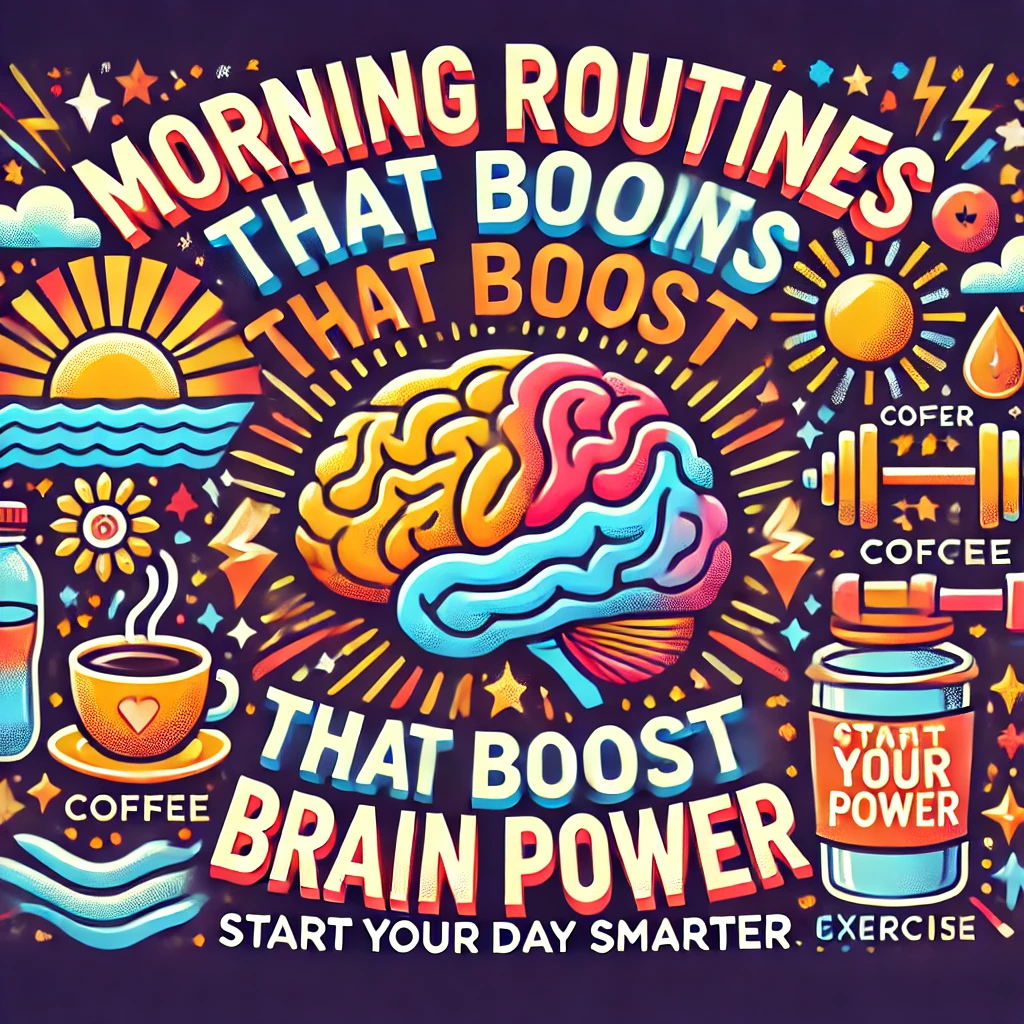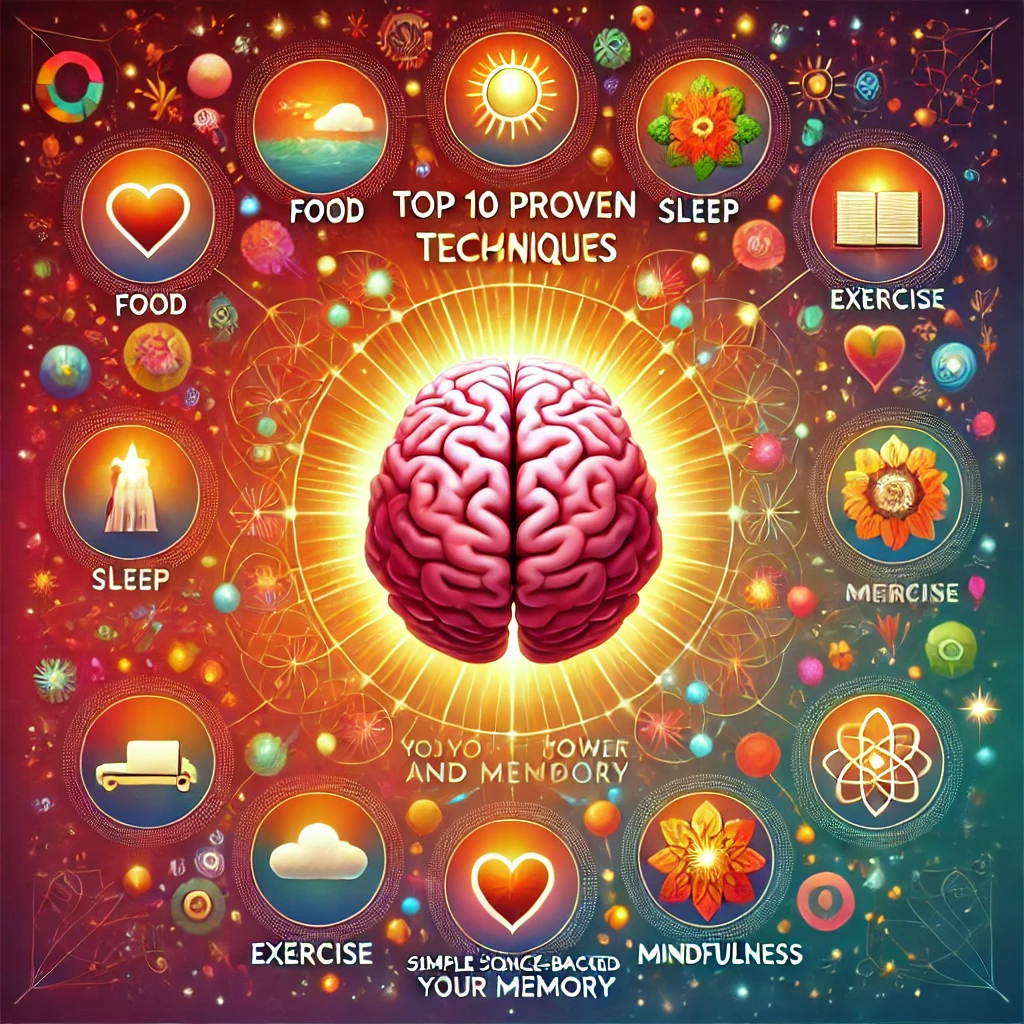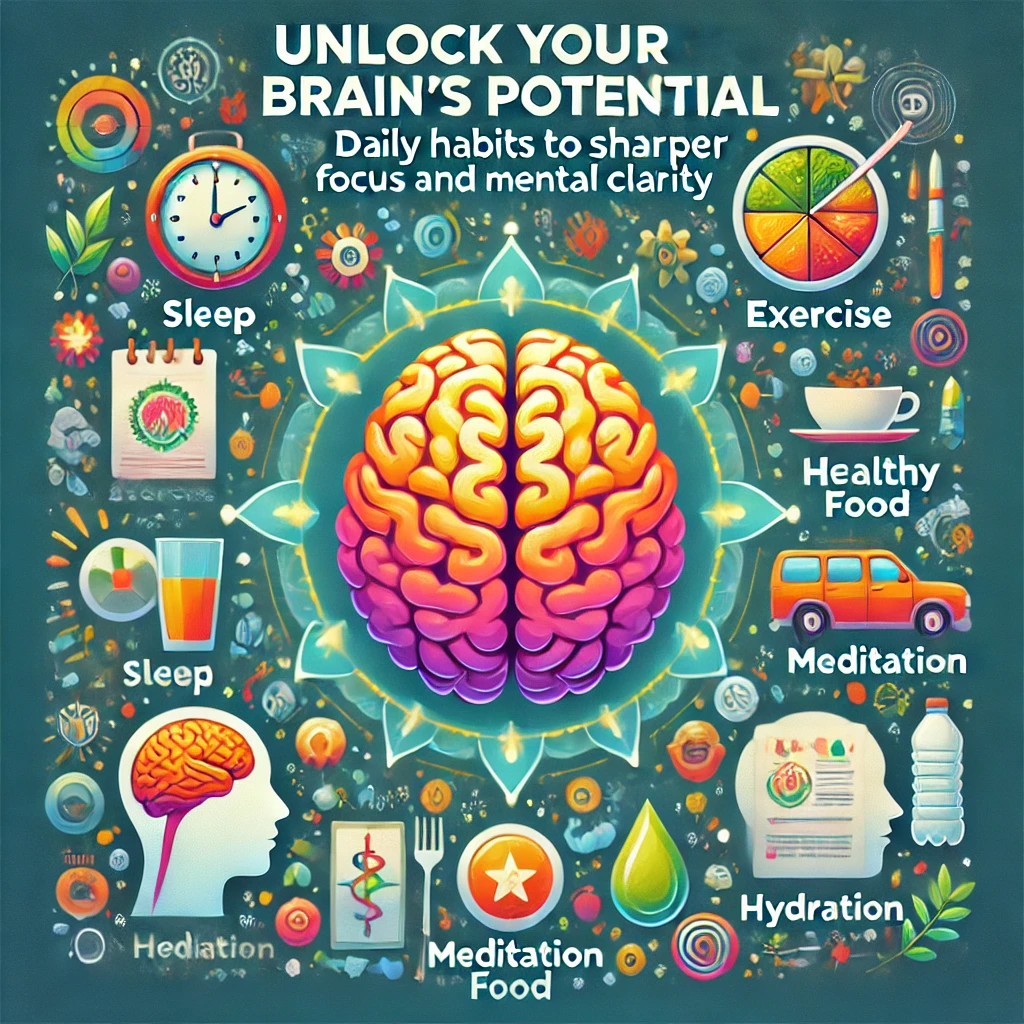Introduction
What if you could start your day with a clear mind, sharp focus, and the mental energy to tackle any challenge? Your morning routine has the power to set the tone for the entire day, especially when it includes brain-boosting activities that prepare your mind for productivity and focus. By incorporating small, intentional habits each morning, you can improve your brain health, increase mental clarity, and give yourself a head start on thinking smarter.
In this article, we’ll explore the best morning routine for brain health, packed with brain-boosting activities that help you start your day with focus and mental sharpness. Whether you’re looking for ways to increase mental focus in the morning or daily habits to improve brain power, these tips can help you make the most of your mornings.
1. Start with Hydration for Mental Clarity
One of the simplest yet most powerful habits you can adopt in the morning is to drink water as soon as you wake up. During the night, your body becomes dehydrated, and since your brain is around 75% water, dehydration can slow down your mental clarity and cognitive abilities. Drinking a glass of water first thing in the morning helps restore your body’s hydration levels, setting the stage for a more focused and energized day.
How hydration boosts brain function in the morning:
- Improves concentration: Hydration helps maintain optimal brain function, improving focus and concentration.
- Increases energy: Water promotes oxygen flow to the brain, which enhances alertness.
- Reduces brain fog: Dehydration can lead to sluggish thinking, so rehydrating helps reduce that groggy feeling.
Relatable anecdote:
I used to skip morning hydration, reaching straight for coffee instead. But when I started drinking a full glass of water as soon as I woke up, I felt more alert within minutes. It was like giving my brain a jumpstart, and I noticed I could focus better on morning tasks without needing as much coffee.
Pro tip:
Try adding a slice of lemon to your morning water for an extra boost of vitamin C, which is beneficial for brain health and immune support.
2. Get Moving with Morning Exercise
Exercise isn’t just good for your body—it’s one of the best morning routines for brain power. Physical activity increases blood flow to the brain, delivering oxygen and nutrients that support mental clarity and sharp thinking. Regular morning exercise is also linked to improved memory and better mood, making it a powerful addition to any brain-boosting morning routine.
Morning exercises for sharper thinking:
- Cardio workouts: Activities like jogging, cycling, or dancing are excellent for increasing blood flow to the brain.
- Yoga and stretching: Mindful exercises like yoga improve mental clarity and focus by reducing stress.
- Quick HIIT workout: A high-intensity interval workout energizes the body and mind, improving alertness and focus.
Example:
A friend of mine, who’s a teacher, started doing a 15-minute yoga session every morning. She told me it’s her secret weapon for staying calm and focused throughout the day, even in a bustling classroom. Just a few minutes of movement made a big difference in her ability to think on her feet.
Pro tip:
If you’re short on time, even a quick five-minute stretching routine can boost brain function in the morning by loosening tension and getting your blood flowing.
3. Fuel Up with a Brain-Boosting Breakfast
A balanced breakfast is essential for maintaining mental clarity and energy levels throughout the morning. Foods rich in omega-3s, antioxidants, and complex carbs can provide the brain with the fuel it needs to perform at its best.
Brain-boosting breakfast foods:
- Oatmeal with berries: Oats provide slow-releasing energy, while berries are high in antioxidants that support brain health.
- Eggs: Packed with choline, which is crucial for memory and focus, eggs are a perfect breakfast option.
- Avocado toast: Avocados contain healthy fats that support cognitive function, and whole-grain bread provides steady energy.
Relatable anecdote:
I used to skip breakfast or grab something sugary on my way to work, but I’d feel foggy and distracted by mid-morning. After switching to oatmeal with nuts and berries, I felt more energized and could focus better on my tasks.
Pro tip:
Add a sprinkle of cinnamon to your breakfast. It’s known to improve cognitive processing and memory, making it a tasty brain-boosting addition.
4. Practice Mindfulness to Start Your Day with Focus
Starting the day with mindfulness or meditation is one of the best morning habits for cognitive boost. Even just a few minutes of meditation can help reduce stress, improve concentration, and enhance mental clarity. Mindfulness also encourages present-moment awareness, which can improve your ability to focus on tasks throughout the day.
How to incorporate mindfulness in your morning routine:
- Start with deep breathing: Take five deep breaths to center your mind and reduce stress.
- Practice a quick meditation: Use a guided app like Headspace or Calm for a five-minute meditation.
- Set an intention: Think about one thing you want to focus on or achieve today. This gives your brain a specific goal, helping direct your focus.
Example:
I used to jump right into emails and to-do lists, which left me feeling stressed before the day even started. Once I added five minutes of mindfulness to my morning, I felt calmer and could tackle my day with a clearer mind.
Pro tip:
If you’re new to mindfulness, try simply focusing on your breathing for a minute or two. This quick practice is enough to improve mental focus without taking much time.
5. Read or Listen to Something Educational
Stimulating your brain with educational content in the morning can prime your mind for learning and cognitive engagement. This practice not only improves brain function in the morning but also builds new neural connections, supporting long-term cognitive health.
Brain-boosting morning activities:
- Read a book or article: Choose topics that interest you or challenge your thinking.
- Listen to a podcast: Educational podcasts on topics like history, science, or personal growth are excellent choices.
- Review a daily learning goal: If you’re learning a new skill, dedicate a few minutes to reviewing what you’ve learned so far.
Example:
I started listening to a 10-minute psychology podcast during breakfast. It wakes up my brain and gives me new ideas to think about throughout the day. It’s a simple habit that makes me feel more engaged and mentally prepared for my work.
Pro tip:
If you’re short on time, try a summary app like Blinkist that condenses books and articles into short, digestible ideas.
6. Write Down Goals and Gratitude for a Positive Start
Setting goals and practicing gratitude in the morning can improve mental clarity and focus. Writing down a few goals helps create a roadmap for the day, giving your brain a clear direction. Gratitude, on the other hand, shifts your focus to positive thoughts, which can reduce stress and improve mental resilience.
How goal-setting and gratitude improve brain health:
- Increases focus: Writing down goals helps you prioritize tasks, which enhances focus.
- Reduces stress: Gratitude practices shift attention away from worries, reducing cortisol levels and promoting mental clarity.
- Boosts mental flexibility: Reflecting on positive things primes the brain to adapt and find solutions during the day.
Example:
I started writing down three things I’m grateful for each morning. This small practice shifted my focus from what was stressing me to what I appreciated, which made me feel more grounded and ready to take on the day.
Pro tip:
Keep a small journal next to your bed so you can quickly jot down goals and gratitude first thing in the morning.
7. Take a Cold Shower for an Energy Boost
Cold showers may sound daunting, but they can have a significant impact on mental alertness. Cold exposure stimulates blood flow, releases dopamine, and helps wake up the nervous system, which supports mental clarity and alertness.
Benefits of cold showers for brain power:
- Increases alertness: Cold water shocks the body awake, promoting alertness and clarity.
- Boosts dopamine: Cold exposure increases dopamine, improving focus and motivation.
- Improves resilience to stress: Cold showers build mental resilience, which can improve stress management and focus.
Example:
I tried a 30-second cold shower in the mornings, and it was like flipping a switch on my brain. It woke me up instantly, and I felt more motivated to get started on my tasks.
Pro tip:
If a full cold shower is too intense, start with just a few seconds at the end of your regular shower. Gradually increase the time as you get used to it.
8. Plan Your Day to Reduce Decision Fatigue
Decision fatigue can drain mental energy, making it harder to focus on important tasks later in the day. By planning your day in the morning, you reduce the number of decisions you have to make, preserving mental energy for more challenging tasks.
Tips for a smarter morning routine with planning:
- Create a to-do list: Write down tasks in order of priority to create a clear plan for the day.
- Use time blocks: Dedicate specific times for focused work, breaks, and other activities.
- Set daily intentions: Identify one or two major goals you want to accomplish, which helps reduce distractions.
Example:
A friend of mine uses time blocking to organize her day, and she swears it’s her secret to staying productive.
It prevents her from feeling overwhelmed, and she can tackle each task with a clear focus.
Pro tip:
Try planning your day the night before to start your morning with a ready-to-go schedule, allowing you to jump into your day with ease.
9. Practice Deep Breathing for a Calm Mind
Deep breathing exercises activate the body’s relaxation response, helping calm the mind and improve focus. This practice is simple yet effective, reducing stress and promoting mental clarity, which makes it easier to concentrate on morning tasks.
How to incorporate deep breathing in your morning routine:
- 4-7-8 breathing technique: Inhale for four counts, hold for seven, and exhale for eight. Repeat this a few times to calm the mind.
- Box breathing: Inhale, hold, exhale, and pause—all for four counts. This helps center the mind and reduce anxiety.
- Diaphragmatic breathing: Breathe deeply from the belly instead of the chest, which promotes relaxation.
Relatable anecdote:
When I started using the 4-7-8 breathing technique in the mornings, I noticed an immediate improvement in my focus. It felt like a mental reset, making it easier to start my day without feeling overwhelmed.
Conclusion
Starting your day with brain-boosting morning activities can improve focus, memory, and overall cognitive performance, setting you up for a productive and mentally clear day. By incorporating these tips—hydration, exercise, a nutritious breakfast, mindfulness, and planning—you can create a morning routine that supports your brain health and mental sharpness.
Remember, it’s the small, consistent changes that make a big difference over time. Try adding one or two of these techniques to your routine, and notice how they help you feel more focused and energized throughout the day. With a few simple tweaks, you can start every morning smarter and more prepared to tackle whatever comes your way.
FAQ Section
1. How does hydration improve brain power in the morning?
Hydration restores water levels in the brain, enhancing focus, mental clarity, and overall cognitive function after a night of dehydration.
2. Can exercise in the morning improve mental clarity?
Yes, exercise increases blood flow to the brain, which improves focus, memory, and mental clarity throughout the day.
3. What are the best brain-boosting foods for breakfast?
Oatmeal, eggs, avocado, berries, and nuts provide essential nutrients that support brain health and sustained mental energy.
4. How does mindfulness help with mental focus?
Mindfulness reduces stress and improves concentration, helping the brain stay focused on tasks more effectively.
5. Is a cold shower beneficial for brain function?
Yes, cold showers increase alertness and dopamine levels, which improve focus and help you feel more awake.
6. Why is planning your day important for mental energy?
Planning reduces decision fatigue, freeing up mental energy for more important tasks and helping you stay focused.
7. How does setting goals and practicing gratitude impact brain health?
Goal-setting improves focus, while gratitude reduces stress and promotes a positive mental state, both of which support cognitive function.
8. Does deep breathing improve morning focus?
Yes, deep breathing reduces anxiety and promotes mental clarity, making it easier to start the day with a calm mind.
9. How can I make time for these morning routines if I’m busy?
Start small, incorporating one or two practices, like drinking water and a quick mindfulness exercise, and build from there as you find what works best for you.



